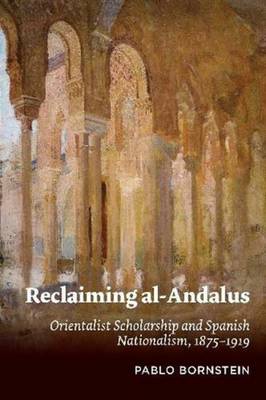
- Afhalen na 1 uur in een winkel met voorraad
- Gratis thuislevering in België vanaf € 30
- Ruim aanbod met 7 miljoen producten
- Afhalen na 1 uur in een winkel met voorraad
- Gratis thuislevering in België vanaf € 30
- Ruim aanbod met 7 miljoen producten
Zoeken
€ 132,95
+ 265 punten
Omschrijving
Reclaiming al-Andalus focuses on the construction of the scholarly discipline of Orientalist studies in Spain. Special attention is paid to the impact that the elaboration of a series of historical interpretations of the legacy left by Muslim and Jewish culture in Spain had over the writing of national history in the period of the Bourbon Restoration. A historiographical account of Spains Orientalism tackles the problematized issues that both Arabist and Hebraist scholars sought to address. Orientalist scholarship thereby became inextricably linked to different interpretations of the historical shaping of Spanish national identity. Political circumstances of the day impacted on the approach these scholars took as they engaged with the Iberian Semitic past. And this at a critical moment in the crystallization of modern Spanish nationalism. A common thread running through the work of these Orientalist scholars was the tendency to nationalize or Hispanicize cultural activity of the Semitic populations that lived on the Iberian Peninsula in medieval times. This Hispanizication was instrumentalized in diverse ways in order to serve nation-building efforts. Hence Orientalist scholarship became integrated into the national debates that were shaping Spanish cultural and political life at the turn of the century. Reclaiming al-Andalus explains how regenerationist projects taking form after the national crisis of 1898, and different polemical discussions around religion-state affairs, deeply influenced the writings of academic Orientalism. The intertwined connection between Orientalist scholarship and nationalist debates in Spain has hitherto been understudied. This book not only contributes to the general debate on modern Orientalism, but most importantly presents a profound new viewpoint to the ongoing debate on the conflictive history of Spanish nationalism.
Specificaties
Betrokkenen
- Auteur(s):
- Uitgeverij:
Inhoud
- Aantal bladzijden:
- 272
- Taal:
- Engels
- Reeks:
Eigenschappen
- Productcode (EAN):
- 9781789760606
- Verschijningsdatum:
- 24/11/2020
- Uitvoering:
- Hardcover
- Formaat:
- Genaaid
- Afmetingen:
- 157 mm x 230 mm
- Gewicht:
- 467 g

Alleen bij Standaard Boekhandel
+ 265 punten op je klantenkaart van Standaard Boekhandel
Beoordelingen
We publiceren alleen reviews die voldoen aan de voorwaarden voor reviews. Bekijk onze voorwaarden voor reviews.







